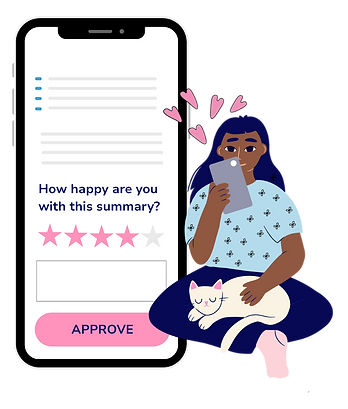Dynamic Carer's Assessments
Reducing waiting lists, making funds go further and helping carers thrive
A transformative leap for local authorities struggling with increasing demand and constrained budgets. Instead of making incremental improvements to an overwhelmed system, this is a fundamentally new approach that addresses key delivery issues head on.
Increase capacity to meet high demand
By helping to deliver assessments at scale, our digital tool tackles the challenges of increasing demand and constrained budgets. This approach directly reduces lengthy waiting lists. Helping to achieve high CQC ratings, protecting the service from future reviews and preventing reputational damage.
Improve workforce retention
Social care workforces are struggling with high burnout and turnover rates, leading to staff shortages. Dynamic Carer's Assessments help to shift social workers focus from administrative strain to efficiency and meaningful support. The outcomes are two fold - improved job satisfaction and better staff retention.
Reduce financial strain
By reducing the cost of assessments, they tackle the compounding cycle of high operational costs that result from service inefficiency. As well as reducing costs incurred when carers reach a crisis point and need higher levels of care.
A new model that delivers
Improved carer experience
Dynamic Carer's Assessments leverage key technologies (including AI) to accelerate carers’ access to support. Carers are able to book their initial self-serve call at a time that works for them (24/7 availability).
Within 30 minutes the carer will either have access to their personalised support plan, or their case will be identified for priority engagement by a social worker.

The dynamic functionality proactively tracks a carer's evolving needs, allowing them to receive continuous tailored support.
Proactive safeguarding

Smart Safeguarding Dashboard is a core feature. It provides social workers with a clear, real-time view of all carers who complete a Dynamic Carer's Assessment (including their support plans and calls). With all the necessary data provided, councils can then apply their risk scores to ensure further safeguarding.
This means that social workers can reduce valuable time spent on administration and focus their expertise where it's needed most.
Empowering social workers
Now social workers can focus confidently on carers with the most complex or urgent support needs because they can:
Dramatically reduce the time on initial assessments and support plan preparation as the latter is automatically generated
Have the assurance that the majority of carers are regularly checked in on and receive real-time support as their situation evolves.

What our partners from Cumberland say
"It’s about efficiency and getting a speedy outcome rather than having to rely on waiting for an assessment to take place."
Paul Latimer, Assistant Director, Adult Social Care, Cumberland Council
"The impact on the provider's capacity is that they can then move straight to the support planning stage of the work and reprioritise their time."
Joel Rasbash, Commissioning Manager, Cumberland
What carers are saying
“I like that you can choose the time they come at. The carer burnout guide and what it sent me this morning was brilliant. It picked up on my current situation.”
- Hannah, caring in Clackmannanshire

"Actually quite liberating as a bot not a person. Takes up less social energy. And I like that I could choose when to do it."
- Kate Rixon, caring in Essex

"I was quite depressed and isolated and the support I've received has really helped so thanks again"
- Seonad Miles-Wilson, caring in Gateshead

